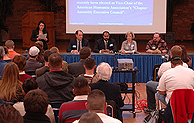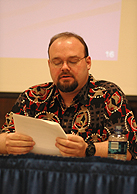 On December 2, 2006, Professor Thi Lam hosted a Philosophy of Religion Panel Discussion at San Jacinto College. It was subtitled, "Exploring the Relationship Between Faith & Morality". The panel consisted of four participants: Jim Ashmore representing Freethought, Zeeshan Ramzan representing Islam, Patricia Gehret representing Christianity, and myself (DT Strain) representing Humanism. It was attended by approximately 200 people, consisting of both Thi Lam's students and visitors from among various beliefs.
On December 2, 2006, Professor Thi Lam hosted a Philosophy of Religion Panel Discussion at San Jacinto College. It was subtitled, "Exploring the Relationship Between Faith & Morality". The panel consisted of four participants: Jim Ashmore representing Freethought, Zeeshan Ramzan representing Islam, Patricia Gehret representing Christianity, and myself (DT Strain) representing Humanism. It was attended by approximately 200 people, consisting of both Thi Lam's students and visitors from among various beliefs. After a brief summary of their position on religion, the panel was asked four questions by the moderator. Following these, members of the audience were able to ask questions to the panelists. Once the event concluded, several panelists and attendees had lunch together at a local restaurant.
Here is a video of this event in two parts. Below the videos are the questions that were asked in Part 1, and my response to each in print form, with some slight variation and elaboration at points. The sound quality is not perfect on these so you may need to turn your volume up to hear...
Part 1: Presentations
Part 2: Questions & Answers
=====================
What is Humanism?
Humanists are people who believe in a natural universe as understood through reason, people who wish to live ethical and meaningful lives without faith in the supernatural, and people who care for their fellow human being. Humanists are informed by science, inspired by art, and motivated by compassion. The International Humanist & Ethical Union summarizes Humanism as follows:
 "Humanism is a democratic and ethical life stance, which affirms that human beings have the right and responsibility to give meaning and shape to their own lives. It stands for building a more humane society through an ethic based on human and other natural values in the spirit of reason and free inquiry through human capabilities. It is not theistic, and it does not accept supernatural views of reality."
"Humanism is a democratic and ethical life stance, which affirms that human beings have the right and responsibility to give meaning and shape to their own lives. It stands for building a more humane society through an ethic based on human and other natural values in the spirit of reason and free inquiry through human capabilities. It is not theistic, and it does not accept supernatural views of reality."Well-Known Humanists include Star Trek creator Gene Rodenberry, Scientist Carl Sagan, Planned Parenthood founder Margaret Sanger, Actor Marlon Brando, Polio Vaccine inventor Jonas Salk, broadcaster Ted Turner, author Kurt Vonnegut, architect Frank Lloyd Wright, and more. The International Humanist & Ethical Union represent the views of over three million Humanists in over 100 national organizations in 30 countries. Still many more people are Humanists by belief, but have simply never heard of term ‘Humanism’.
1. Do you find the Divine Command Theory to be persuasive? Is it a viable ethical theory that one can use in the real world to resolve ethical problems? Are there any difficulties in its application?
For the DCT to be persuasive, one would first have to provide rational reasons to believe that such a God that issued moral commands existed in the first place. They would then need to provide reasons as to how we know what it is such a being is actually commanding. Therefore, the DCT is not persuasive to Humanists.
Nor is the DCT a viable theory one can use to resolve ethical problems in the real world, unless we are speaking only of ethical problems that arise between those members of the same close religious sect. These people can resolve ethical issues by resorting to their shared beliefs. For the rest of the world, or between members of different belief systems, the DCT is practically useless – certainly for Humanists it is.
Instead, Humanists say that the good is good in its own right. The Humanist Manifesto III states that, “Ethical values are derived from human need and interest as tested by experience.” The Humanist Manifesto 2000 says, “Using reason and cognition will better enable us to appraise our values in the light of evidence and by their consequences.”
Humanists believe it is the consequences on overall human happiness and wellbeing that determine whether or not a value, a virtue, or an ethic is good. In our view, no supernatural sanction or command is needed to justify the wisdom of being good.
2. Can one lead a morally virtuous life without belief in God? If so, how?
There have been numerous examples of virtuous people who lacked a belief in a personal God. There have also been numerous examples of theists who lived very unethical lives. Contrary to popular conception, there is no statistical evidence that theists are any more law abiding, civil, just, or ethical than nontheists. Although legal adherence is not identical to ethics, it is something which is easier to measure. We can at least know that – statistically – a higher percentage of theists find themselves in prison than nontheists, and that sort of comparison accounts for the fact that theists outnumber nontheists.
Authoritarianism may be a necessary approach for very young children who are learning discipline and can’t yet comprehend ideas about right and wrong. But Humanists believe that real morality – real virtue – cannot come from the extortion of punishments or threat of suffering. We believe that ethical values can’t be properly understood if they are represented merely as authoritative edicts without appreciation of exactly how and why a moral character is important to human wellbeing.
Humanists believe that when a person is raised to view morality merely as obedience, they miss out on a more mature understanding of moral excellence as a part of a healthy, happy, and compassionate human life.
Such a mythological view of the world seems to repress that deeper understanding of morality and keep the theist at a childlike level of moral maturity. For the Humanist then, the real question becomes, “Is it really possible to lead a morally virtuous life with a belief in such a God?”
3. How can parents best teach their children about morality?
Humanists are fully convinced that morality, at its heart, makes sense. Morality is rational, it is logical, it is practical, it is compassionate, and it is helpful. To be sure, we believe parents should teach their children to think critically, to value truth over what they simply want to believe is true, to question authority, and to have a healthy skepticism and curiosity to find out for themselves. These skills will help them engage in moral deliberation but will also serve them well in other areas.
Beyond good thinking skills, Humanists believe it is important to nurture a child’s natural sense of empathy. Empathy is something humans have which allows us to identify with what other people are feeling, and to see things from others’ perspective. This inclination can be suppressed through abuse and neglect, or nourished by a loving environment and active examples and lessons.
Next, Humanists teach their children about tolerance and love for their entire human family. Being a minority, Humanist children have often experienced ridicule or ostracism for not participating in prayers, not holding a belief in gods, and so on. It is important to teach all children not to build unfounded ideas about whole groups based on the actions of a few, and not to engage in the same sort of behavior in return. It is important to teach them to provide an example of Humanist values in their own actions - that differences are best addressed with compassion for others and honest, considerate dialogue. Lastly, Humanists believe that people should live their values, and not be hypocrites – proclaiming one belief but living their lives in contradiction to those beliefs.
4. From your position, what is the meaning of life?
The word ‘meaning’ necessarily refers to someone for whom something has meaning. It is nonsensical to say “x means y” without saying “x means y TO someone”. When most theists talk about the meaning of life, what they are really asking is, “what is the meaning of my life to God?”
Humanists believe that we each have the right and ability to define our own meaning in life. The meaning of life for me may be different from the meaning of life for you - and this is far superior to having your life’s meaning handed to you on a platter.
As naturalists, Humanists believe that our minds and our consciousness arise from the activity of our brains. When this activity stops, we have every reason to believe that our conscious life ceases. This is the very reason why Humanists hold that life is sacred and each day of our lives is priceless. As with the laws of supply & demand, the more limited a commodity is, the more valuable it becomes - so each day of a finite life is of far greater worth than those of an infinite life.
While some may view a finite life negatively, Humanists believe that life should not be viewed as a means to an end - as in, "What did I live for?" Instead, life should be viewed as an end unto itself; to be enjoyed for its own sake. The value in life is in the living of it.
A good illustration of this can be found in the example of other finite experiences: sand castles and ice sculptures. Why do we build these? Neither structure is permanent and yet, for the audience the value is higher because of the transience of the experience. For the artist, the joy is in the creation process, rather than the finished product per se. This is not unlike the Tibetan Monks who go to great lengths to pour colored sand into meticulous elaborate designs. These designs are eventually swept away but, for the monks, it is the process of creating them that serves as a spiritual experience. In life, it is each day we live and the experiences we have that have a value in and of themselves. This is the "now" of Eastern and Stoic thought and it is one way to find great meaning in life.
There are certainly some other common avenues and experiences that tend to yield happy and fulfilling lives, and many philosophers have spent lifetimes exploring good ideas on this. We often find that the positive contributions we make to others can give great meaning to our lives. To many, a meaningful life consists of being a good parent, a good spouse, and so on - contributing positively to the world around us. In this way we live on in the memories of others and the effects we had on the world.
